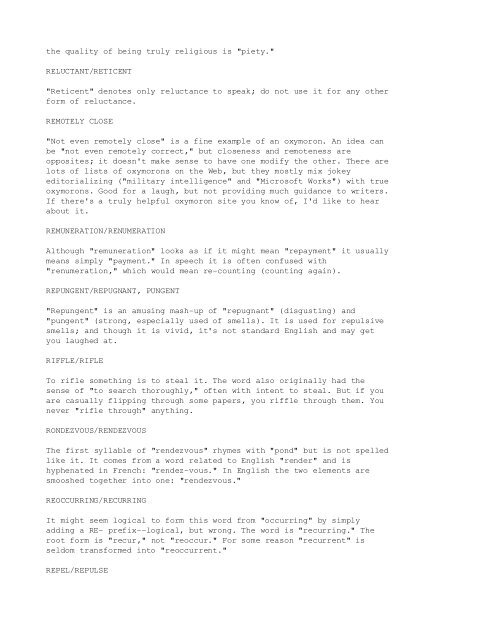Common_Errors_in_English_usage
Common_Errors_in_English_usage
Common_Errors_in_English_usage
Create successful ePaper yourself
Turn your PDF publications into a flip-book with our unique Google optimized e-Paper software.
the quality of be<strong>in</strong>g truly religious is "piety."<br />
RELUCTANT/RETICENT<br />
"Reticent" denotes only reluctance to speak; do not use it for any other<br />
form of reluctance.<br />
REMOTELY CLOSE<br />
"Not even remotely close" is a f<strong>in</strong>e example of an oxymoron. An idea can<br />
be "not even remotely correct," but closeness and remoteness are<br />
opposites; it doesn't make sense to have one modify the other. There are<br />
lots of lists of oxymorons on the Web, but they mostly mix jokey<br />
editorializ<strong>in</strong>g ("military <strong>in</strong>telligence" and "Microsoft Works") with true<br />
oxymorons. Good for a laugh, but not provid<strong>in</strong>g much guidance to writers.<br />
If there's a truly helpful oxymoron site you know of, I'd like to hear<br />
about it.<br />
REMUNERATION/RENUMERATION<br />
Although "remuneration" looks as if it might mean "repayment" it usually<br />
means simply "payment." In speech it is often confused with<br />
"renumeration," which would mean recount<strong>in</strong>g (count<strong>in</strong>g aga<strong>in</strong>).<br />
REPUNGENT/REPUGNANT, PUNGENT<br />
"Repungent" is an amus<strong>in</strong>g mashup of "repugnant" (disgust<strong>in</strong>g) and<br />
"pungent" (strong, especially used of smells). It is used for repulsive<br />
smells; and though it is vivid, it's not standard <strong>English</strong> and may get<br />
you laughed at.<br />
RIFFLE/RIFLE<br />
To rifle someth<strong>in</strong>g is to steal it. The word also orig<strong>in</strong>ally had the<br />
sense of "to search thoroughly," often with <strong>in</strong>tent to steal. But if you<br />
are casually flipp<strong>in</strong>g through some papers, you riffle through them. You<br />
never "rifle through" anyth<strong>in</strong>g.<br />
RONDEZVOUS/RENDEZVOUS<br />
The first syllable of "rendezvous" rhymes with "pond" but is not spelled<br />
like it. It comes from a word related to <strong>English</strong> "render" and is<br />
hyphenated <strong>in</strong> French: "rendezvous." In <strong>English</strong> the two elements are<br />
smooshed together <strong>in</strong>to one: "rendezvous."<br />
REOCCURRING/RECURRING<br />
It might seem logical to form this word from "occurr<strong>in</strong>g" by simply<br />
add<strong>in</strong>g a RE prefixlogical, but wrong. The word is "recurr<strong>in</strong>g." The<br />
root form is "recur," not "reoccur." For some reason "recurrent" is<br />
seldom transformed <strong>in</strong>to "reoccurrent."<br />
REPEL/REPULSE





